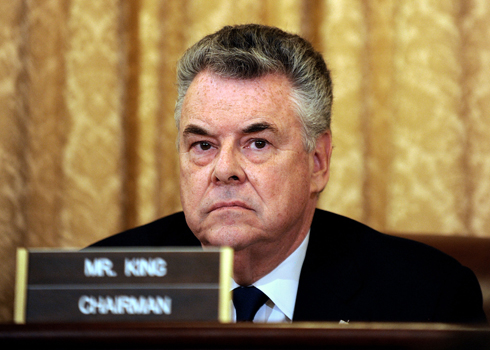Constitutions were waved. Tears were shed. Off-color analogies were made. And, of course, Randall Terry, Code Pink and a massive pack of cameras were there for the highly-publicized, intensely debated hearings on the “Extent of Radicalization in the American Muslim Community and that Community’s Response” held by Rep. Peter King (R-NY) on Thursday.
The four hours of testimony yielded few new ideas about how to deter homegrown extremism, or insight on the breadth of the problem. Instead, members of Congress fixated on a somewhat moot point — whether the hearing was such a brilliant idea in the first place.
In his opening statement, King hit back at those who’ve been critical of the limited scope of the hearings. He justified his decision, saying that the threat of neo-Nazis and lone mad men don’t compare to the threat of al-Qaeda. “Despite what passes for conventional wisdom in certain circles, there is nothing radical or un-American in holding these hearings,” he said.
Rep. John Dingell (D-MI), the longest serving member of the House of Representatives, issued a warning about McCarthyism. “For years, I ran investigative committees,” he said. “I kept a picture of Joe McCarthy hanging on the wall so that I would know what it was I did not want to look like, to do or to be.”
Photo selection came up once again when a Republican praised King for placing a photo of the World Trade Center attack and a photo of two shining beams of light over New York City on the back wall of the Committee’s hearing room.
Outside the hearing, anti-abortion rights activist Terry promoted his new film “What Would Muhammad Do?” and told a House staffer who said he had to return to the back of the line after he stepped out for media interviews that it worked quite differently at Wal-Mart.

Inside the packed hearing room, a Code Pink activist held up a sign imploring Congress not to demonize the Muslim community and wore a shirt reading “No Bigotry” and the Traditional Values Coalition handed out press releases calling Islam “a geo-political military system wrapped in a cloak of religious belief that penalizes conversion with death.”
In the most emotional moment of the hearing, Rep. Keith Ellison (D-MN) was moved to tears while telling the story of a Muslim first responder who lost his life on Sept. 11. Ellison, the first Muslim-American elected to Congress, has been vocally opposed to the hearings’ focus on Muslims.
The Council on American-Islamic Relations (CAIR) came under frequent attack from Republicans on the Committee. King called on all “responsible Muslim American leaders” to reject CAIR and Rep. Frank Wolf (R-VA) said the organization was “hurting” the American Muslim community. “My concern is not limited to its disturbing origins and connections to terrorist finances,” Wolf said. “I’m equally concerned about it’s role attacking the reputation of any who dare to raise concerns about domestic radicalization.” Rep. Chip Cravaack (R-MN) said CAIR was “basically… a terrorist organization.”
And then there was Rep. Dan Lungren (R-CA), who said it was unfair to criticize the hearings for having a “singular focus,” because they are “looking at a specific problem and we’re trying to deal with it” — just like similar panels, he said, that dealt with neo-Nazis, the KKK, and militia groups.
In the end, each side came out of the hearing at about the same place they started, with King’s supporters claiming the hearing had started a dialogue on the issue of Muslim radicalization, and his detractors claiming it didn’t accomplish any such thing.
The Muslim Public Affairs Council called the hearing a “squandered opportunity for a critical conversation on violent extremism,” saying the committee picked a political circus over problem solving. “Today’s hearings did nothing to solve the problem of violent extremism. Instead, [King] targeted an entire population of Americans and tried to scapegoat them as the source of problem without providing any credible evidence,” said Salam Al-Marayati, MPAC President, in a statement.
Wade Henderson, president and CEO of the Leadership Conference on Civil and Human Rights, invoked the famous words of Special Counsel for the Army Joseph N. Welch in response to the McCarthy hearings, saying that King “should be tempered by common sense and common decency; and in that regard, Peter King has gone a step too far.”






